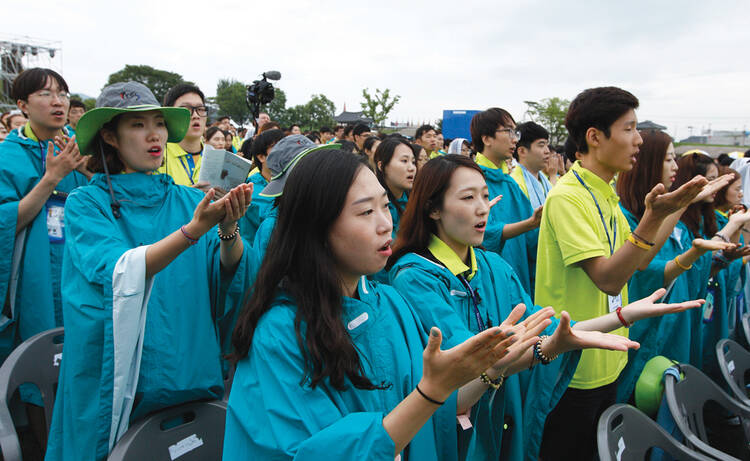Pope Francis opened new horizons for the Catholic Churches in Asia with a groundbreaking talk on Aug. 17 to 70 bishops from 36 countries of this vast continent, in which he encouraged them to engage in a dialogue that must not only be based on identity but also must be done with “empathy.”
Near the end of his talk, the pope told the bishops he earnestly hopes those countries of Asia “with whom the Holy See does not yet enjoy a full relationship, may not hesitate to further a dialogue for the benefit of all.”
Six Asian countries do not have diplomatic relations with the Holy See today: China, North Korea, Vietnam, Myanmar, Laos and Brunei. Francis explained that he wished to dialogue with them and made clear that “I am not only talking here of a political dialogue, but of a fraternal one.”
The pope extended the hand of friendship to those countries when he spoke to his “brother bishops” in the crypt chapel of the Shrine of Martyrs at Haemi, about 80 miles south of Seoul. Afterward he had lunch with the bishops and later that day celebrated the closing Mass for the Asian Youth Day. The pope spent a busy five days in South Korea, where he also beatified 124 martyrs from the infancy period of the local church.
Pope Francis began his talk to the bishops by telling them that in Asia, with its great variety of cultures, “the church is called to be versatile and creative in her witness to the Gospel through dialogue and openness to all.”
He reaffirmed the conclusion of the Synod for Asia in 1998 that “dialogue is an essential part of the mission of the church in Asia.”
His immediate predecessors, John Paul II and Benedict XVI, had firmly insisted that the fundamental point of reference for Catholics who engage in dialogue with individuals and cultures must be their own identity as Christians.
In his talk on Aug. 17, Pope Francis also insisted on the crucial importance of identity: “We cannot engage in real dialogue unless we are conscious of our own identity.” But he significantly added, “Nor can there be authentic dialogue unless we are capable of opening our minds and hearts, in empathy and sincere receptivity, to those with whom we speak.”
By putting emphasis on empathy as well as identity, Pope Francis is bringing in a whole new dimension to the understanding of dialogue with other cultures and other religions. It is a dimension that has been given little—if any—attention in recent decades in pontifical and Vatican documents.
Explaining this dual emphasis, Francis said: “A clear sense of one’s own identity and a capacity for empathy are thus the point of departure for all dialogue. If we are to speak freely, openly and fruitfully with others, we must be clear about who we are, what God has done for us, and what it is that he asks of us. And if our communication is not to be a monologue, there has to be openness of heart and mind to accepting individuals and cultures.”
He explained that empathy in dialogue “challenges us to listen not only to the words others speak, but to the unspoken communication of their experiences, their hopes and aspirations, their struggles and their deepest concerns.”
This kind of empathy, he said, “must be the fruit of our spiritual insight and personal experience, which lead us to see others as brothers and sisters, and to ‘hear,’ in and beyond their words and actions, what their hearts wish to communicate.”








